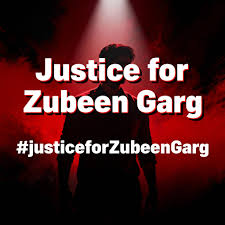
Garima Saikia Garg Appeals for Justice for Zubeen in Sonapur

 :
| Updated On: 11-Oct-2025 @ 12:55 pm
:
| Updated On: 11-Oct-2025 @ 12:55 pmSHARE
On the night of October 10 in Sonapur, thousands gathered for an emotionally charged event following the untimely death of legendary singer-composer Zubeen Garg. The atmosphere was intensely moving as Garima Saikia Garg, the singer’s widow, appeared before the crowd, her eyes brimming with tears and hands folded in prayer. Standing before her husband’s admirers, Garima delivered a heartfelt and poignant appeal for justice, expressing the deep grief and anguish of losing her spouse under suspicious circumstances. Her emotional display resonated strongly with everyone present, creating a profound sense of unity and shared sorrow among the attendees.
Garima addressed the crowd with a plea for support, urging the people of Assam, as well as fans and admirers worldwide, to join her in demanding truth and accountability. She emphasized that her grief should be channeled into collective action for justice. In a call to action, she requested everyone to participate in the movement by posting and sharing the hashtag #JusticeForZubeenGarg on social media, thereby amplifying the demand for transparency and fairness in the ongoing investigation into her husband’s death. Her voice quivered as she bowed before the crowd, tears streaming down her face, repeatedly urging cooperation from all present. The scene, filled with raw emotion and pain, deeply touched the audience, many of whom were visibly overcome with emotion, highlighting the deep connection and admiration that people felt for the late artist. Throughout the night, chants of “Jai Zubeen Da!” reverberated through the air, symbolizing solidarity and respect for Zubeen’s legacy.
Supporters of Zubeen Garg spoke of him not merely as an artist but as an enduring emotion and cultural force whose music and humanitarian values had bridged generations. His songs, deeply ingrained in the cultural fabric of Assam and beyond, had created bonds between people of varying ages and backgrounds, establishing him as a unifying figure whose influence transcended entertainment. This perception of Zubeen as both an artist and a symbol of compassion and unity intensified the emotional impact of Garima’s appeal, further motivating the attendees to rally behind her demand for justice.
The event also witnessed symbolic acts of remembrance and solidarity. Many participants lit candles and held posters depicting the singer, creating a visual tribute that reflected the collective mourning and respect for Zubeen. These gestures demonstrated the community’s commitment to seeking accountability and ensuring that the circumstances surrounding his death were thoroughly investigated. The attendees vowed to sustain their advocacy for a transparent and impartial inquiry, underscoring the public’s resolve to ensure that justice is served.
In summary, Garima Saikia Garg’s emotional appeal in Sonapur on October 10 was a powerful moment of grief, solidarity, and collective action. By addressing the crowd with sincerity and urgency, she mobilized support across Assam and globally, transforming personal loss into a broader campaign for accountability. The gathering highlighted Zubeen Garg’s enduring influence as both an artist and a humanitarian figure, while simultaneously demonstrating the community’s commitment to justice and transparency in the investigation of his untimely death. Through tears, prayers, social media advocacy, and symbolic acts, the crowd honored his memory and pledged continued support for a fair and thorough inquiry.